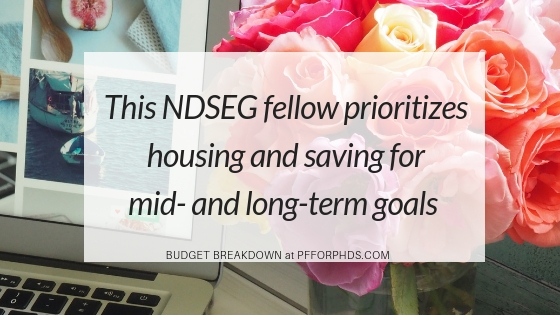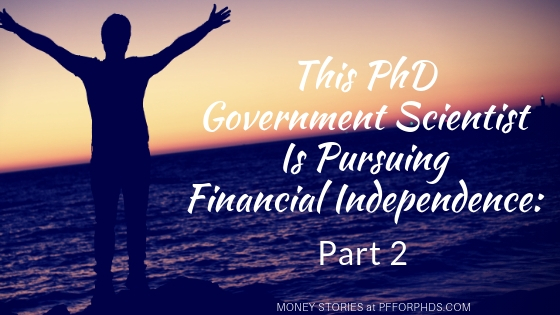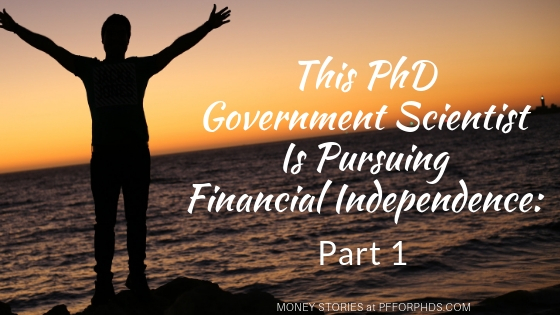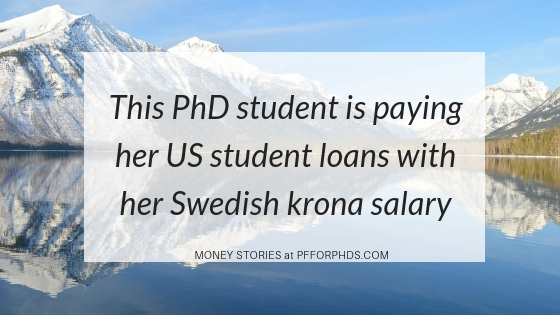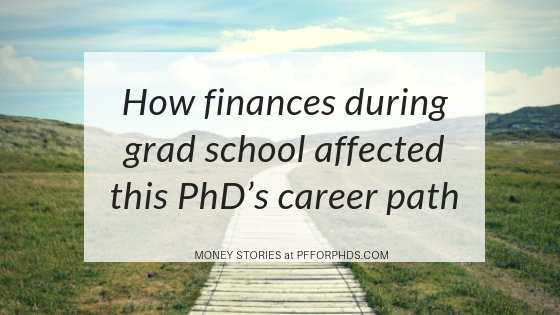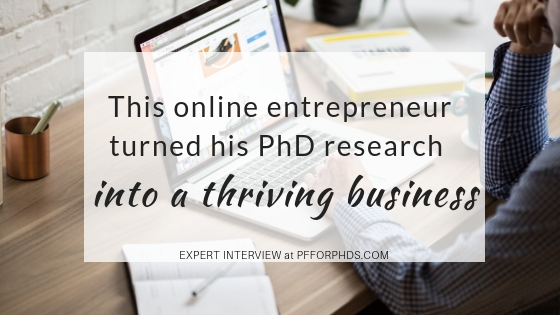In this episode, Emily interviews Lourdes Bobbio, a graduate student in materials science at Penn State and NDSEG fellow. Lourdes breaks down the top five expenses in her budget: housing, food, taxes, utilities, and subscription services. She explains the financials systems she has put in place to reach financial success during her PhD: targeted savings, automated transfers, quarterly estimated tax, high-yield savings accounts, and taxable retirement investments with a roboadvisor. Lourdes has decided to prioritize her housing within her budget, but still balances that expense with plenty of saving for her future wedding and retirement.
Links mentioned in episode
- Financially Navigating Your Upcoming PhD Career Transition
- Personal Finance for PhDs Podcast Hub
- Volunteer as a Guest for the Podcast
- Quarterly Estimated Tax for Fellowship Recipients
- Lourdes’s WealthFront referral link
0:00 Introduction
1:07 Please Introduce Yourself
Lourdes Bobbio is a fourth year PhD student at Penn State University in State College, Pennsylvania. She is in the materials science and engineering department. She currently lives alone.
1:55 What is your income?
Lourdes is on the National Defense Science and Engineering Graduate fellowship. She makes $38,400 each year which is $3,200 per month. She says that this income goes pretty far in State College.
2:37 What are your five largest expenses each month?
Lourdes explains that the cost of living in State College is fairly low, especially compared to where she grew up near Washington, DC and where she went to undergraduate in Boston. She was more accustomed to high cost of living. Her top expenses are rent, taxes, food, utilities and subscription services.
3:08 #1 Expense: Rent
Lourdes lives in the downtown area of State College. She lives on her own without roommates. She determined that she values being able to walk to work every day, living close to campus, living near restaurants, and living by herself. She doesn’t have a car, so she doesn’t have car related expenses in her budget. She says she has never owned a car. She says a majority of graduate students in State College have a car. The town is small and there is a limited number of things to do. If you want to go away for the weekend, having a car is useful. She says there is an abundance of housing close to campus and a fairly good bus system.
She spends about $1500 per month for rent. She lives in a one bedroom with an office space which could be a second bedroom. She values having a space of her own. Because it is a college town, it runs on the school schedule. She says the cycle of finding apartments is over in November and December. She has lived in the same place for her whole time in graduate school. She says for her first year of graduate school, she wasn’t on the NDSEG fellowship. Her parents helped her pay rent a little bit and they stayed in the office room when they came to visit her. When she got her fellowship, she determined she could pay for the apartment on her own.
Lourdes says that her boyfriend has a car, and several of her friends own a car. When she wants to travel out of town, she goes with them.
8:46 #2 Expense: Taxes
Lourdes charges herself for taxes. Because she has fellowship income, she does not have automatic withholding for her taxes, so she needs to make quarterly estimated tax payments to the IRS. When she gets paid at the beginning of the month, she takes out the money for taxes right away and puts it into a savings account. When it’s time to make the quarterly payment, she has the money available. Emily emphasizes that the majority of fellows do not have taxes withheld and fellows need to withhold taxes themselves.
When she first got her fellowship and realized that no taxes would be withheld, she had to go through the process of filling out the 1040-ES worksheet to figure out the total amount that she would owe. She figured that out and divided it by twelve so she could save that amount each month. She has a spreadsheet to plan her budget for the entire year. She sets it aside in a high yield savings account until she has to pay it each quarter. Emily explains that 1040-ES is not submitted to the IRS and she has a workshop to help people work through the form.
Lourdes banks with Discover online bank and she also has a credit card with them. She puts her long term savings there. She has a checking account with a local credit union and a short term savings account.
13:42 #3 Expense: Food
Lourdes includes groceries and going out to eat in her food expenses. She says she spends more on dining out than she would like to, but she doesn’t feel guilty about it because she budgets for it and knows how much she can spend. Emily shares that budgeting is “freeing” and Lourdes agrees. Lourdes says that she values the social time that is associated with dining out. She spends about $200 to $300 per month on food.
15:42 #4 and #5 Expense: Utilities and Subscription Services
Lourdes says that she pays $30 to $40 on electricity. She pays about $25 per month on subscription services, Netflix and Spotify. She says that Audible is about $15 per month and she recently cut it. She reevaluates what she is subscribed to each year.
Her apartment has internet and cable included. She wouldn’t have paid for cable if it wasn’t included. She says that internet can be pricey and she’s glad it is included in her rent.
19:08 What are you currently doing to further your financial goals?
Lourdes has short term, mid term, and long term goals. She says she has two savings accounts to break down her goals. She has a savings account through her credit union that’s connected to her checking account. She puts money for her short term goals there. Her mid term and long term goals go into her high yield savings account.
Her short term goals include a general travel fund. She takes a bus to go to DC to visit her parents. She puts about $15 to $20 per month for travelling home. She has a gift fund as well, which helps her save for going to weddings. She has a “fun fund” where she saves for higher price experiences, like going to Broadway shows that have $60 tickets. She also uses her fun fund for buying items for her hobbies, like baking equipment. Emily says that she calls this a system of targeted savings account. This is a system for saving for irregular expenses.
Her mid term savings goals is for her wedding. She is saving about a couple hundred dollars per month for her wedding. She is also thinking about buying a house in the future and she is saving with that in mind. Additionally, because she is on a fellowship, she has to pay out of pocket for her health insurance. Recently when she had to be taken off of her parent’s health insurance, she used her emergency savings account to pay for health insurance. Now she has been saving for her next year’s health insurance premium.
26:28 Do you have long term goals?
Lourdes is also saving for retirement. For one year in graduate school, before she was on her fellowship, she was able to max out her Roth IRA. She learned that she is not eligible to contribute to a Roth IRA while on a fellowship. Now she invests in a general taxable brokerage account. She does not contribute as much but she tries to put $100 or $200 per month into it.
Emily explains that your eligibility for an IRA depends on you having taxable compensation or earned income. For graduate students, this means W-2 pay which is typically an assistantship. The NDSEG fellowship doesn’t count as taxable compensation or earned income. At this point, many people don’t bother saving for retirement because they don’t have an IRA. Emily encourages investing at as an early an age as possible.
Lourdes said when she learned about the tax and retirement savings of her fellowship, she realized that she would have to invest in a taxable account. She did a lot of research into what she wanted to invest in. She didn’t feel very knowledgeable. She used Vanguard for her Roth IRA but she wanted to try something else. She currently uses an online roboadvisor Wealthfront, which she likes so far. She says it is an easy way to get a broad portfolio. She thinks in the future she would move to somewhere with lower fees. She says she has no fees because her amount is below the threshold of $15,000. Wealthfront lowers the threshold with referrals. Her referral link in these shownotes.
32:30 What is your best financial advice that you’d share with your peers?
Lourdes advises not to be afraid of having a budget. She says many people are worried that budgets are restricting. She says that budgets are freeing, especially as a graduate student on a limited income. She says the budget gives her freedom that is very valuable and makes finances less scary.
